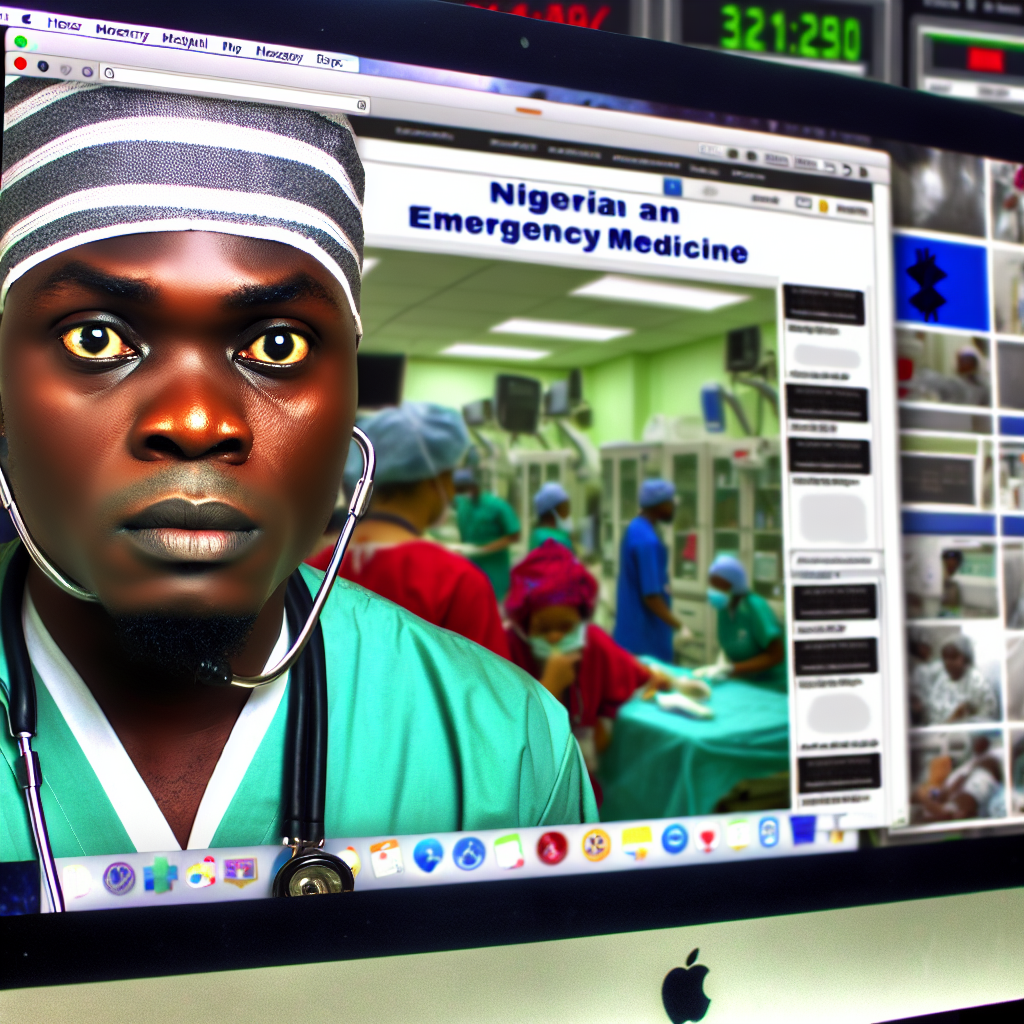Introduction
In Nigeria, emergency medicine is an essential component of healthcare delivery.
With the increasing incidents of emergencies, there is a growing need for well-trained professionals in this field.
Proper training in emergency medicine is crucial for saving lives and reducing morbidity rates in the country.
Without adequate training, healthcare providers may not be equipped to handle emergency situations effectively.
Brief overview of emergency medicine in Nigeria
Emergency medicine in Nigeria is still developing, with limited resources and infrastructure in many healthcare facilities.
However, there is a growing recognition of the importance of this specialty in improving healthcare outcomes.
Importance of proper training in emergency medicine
Proper training in emergency medicine is vital for timely and effective management of critical conditions.
It ensures that healthcare providers have the skills and knowledge to handle emergencies with confidence.
Purpose of the blog post
This blog post aims to highlight the opportunities available for training in emergency medicine in Nigeria.
It will discuss the various training programs, institutions, and resources that professionals can leverage to enhance their skills in this critical field.
Current State of Emergency Medicine Training in Nigeria
Emergency medicine training in Nigeria is facing several challenges that hinder its effectiveness and efficiency.
These challenges include:
Lack of Structured Training Programs
- The absence of well-organized and standardized training programs in emergency medicine is a major setback in Nigeria.
- Most healthcare institutions do not have a structured curriculum for training emergency medical professionals.
- This lack of structured training programs limits the quality of education and preparation of emergency medicine practitioners.
Limited Access to Resources and Equipment
- Many healthcare facilities in Nigeria suffer from a shortage of essential resources and equipment needed for emergency medicine training.
- Lack of access to modern technology and tools hampers the practical training and skill development of emergency medical professionals.
- Inadequate funding and support for emergency medicine training programs contribute to the scarcity of resources and equipment in Nigeria.
Inadequate Number of Trained Professionals
- There is a significant shortage of trained emergency medicine professionals in Nigeria to cater to the growing healthcare needs of the population.
- The lack of sufficient trained professionals leads to overwhelmed healthcare facilities and compromises the quality of emergency medical care provided.
- Insufficient investment in training and education programs for emergency medical professionals contributes to the shortage of skilled workers in Nigeria.
The current state of emergency medicine training in Nigeria is facing critical challenges due to the lack of structured training programs.
These issues include limited access to resources and equipment, and the inadequate number of trained professionals.
Addressing these issues is essential to enhance the quality of emergency medical care and improve the overall healthcare system in Nigeria.
Opportunities for improving emergency medicine training
Collaborating with organizations like WHO can bring in expertise and resources for training.
Collaboration with international organizations
Creating local training programs tailored to the specific needs of Nigeria can enhance education.
Development of local training programs
Increased support and funding from the government can improve infrastructure and quality of training.
Government support and funding
Uncover the Details: ENT Surgery for Ear Infections: Nigerian Perspective
Benefits of Proper Emergency Medicine Training
Increased survival rates
Proper training equips healthcare providers with necessary skills and knowledge.
Quick and effective response during emergencies can significantly increase patient survival rates.
Improved patient outcomes
Training ensures healthcare providers are capable of making accurate diagnoses.
Proper management and treatment protocols lead to better outcomes for patients.
Reduced healthcare costs
Effective training can help prevent unnecessary hospital admissions and interventions.
By improving efficiency and quality of care, healthcare costs can be significantly reduced.
Delve into the Subject: Restorative Dentistry: Patient Rights and Care
Challenges in Implementing Better Training Programs
One of the major challenges facing emergency medicine training in Nigeria is the lack of awareness about the importance of such programs.
Many healthcare professionals and policymakers are not fully informed about the significance of training programs in improving the quality of emergency care.
This lack of awareness often leads to a lack of support for implementing better training programs.
- Lack of Awareness and Support
- Resistance to Change
Another significant challenge is the resistance to change among healthcare professionals.
Many practitioners are accustomed to traditional methods of care and are hesitant to adopt new approaches or technologies.
This resistance can hinder the implementation of new and improved training programs in emergency medicine.
- Infrastructure and Resource Limitations
The lack of adequate infrastructure and resources also poses a challenge to the implementation of better training programs.
Many healthcare facilities in Nigeria lack modern equipment, technology, and facilities needed to provide comprehensive training in emergency medicine.
Without proper infrastructure and resources, it becomes difficult to offer high-quality training programs to healthcare professionals.
Addressing the challenges of lack of awareness and support, resistance to change, and infrastructure limitations is crucial for improving emergency medicine training in Nigeria.
By overcoming these obstacles, the country can enhance the quality of care provided in emergency situations and ultimately save more lives.
Transform Your Career with Expert Guidance
Get personalized mentorship consulting that’s tailored to your unique path. Our expert advice is actionable and exclusive.
Get StartedFind Out More: Diabetic Retinopathy: How Nigerian Doctors are Fighting It

Examples of successful training programs
Several training programs in emergency medicine have been implemented in Nigeria.
Programs such as the Basic Life Support (BLS) and Advanced Cardiac Life Support (ACLS) courses have been introduced.
These programs have equipped healthcare professionals with essential lifesaving skills.
They can now handle emergency situations effectively.
Impact on healthcare system
The impact of emergency medicine training on the healthcare system in Nigeria has been profound.
Trained professionals are now better equipped to handle emergencies.
This has resulted in improved patient outcomes and reduced mortality rates.
The training has also enhanced the overall quality of healthcare services in the country.
Testimonials from trained professionals
Many healthcare professionals have shared positive experiences from emergency medicine training in Nigeria.
Trained individuals highlight how the training has boosted their confidence in managing critical situations.
They report improved communication skills with patients and their families.
Overall, their clinical decision-making abilities have enhanced significantly.
Discover More: Biomedical Technology Career Paths and Salaries Nigeria
Importance of Emergency Medicine Training
Emergency medicine training is essential for saving lives and improving healthcare in Nigeria.
Stakeholders must support and invest in training programs to enhance the skills of medical professionals.
With increased focus and commitment, there is hope for a better future for emergency medicine in Nigeria.
Additional Resources
Paediatric emergency medicine practice in Nigeria: a narrative …




